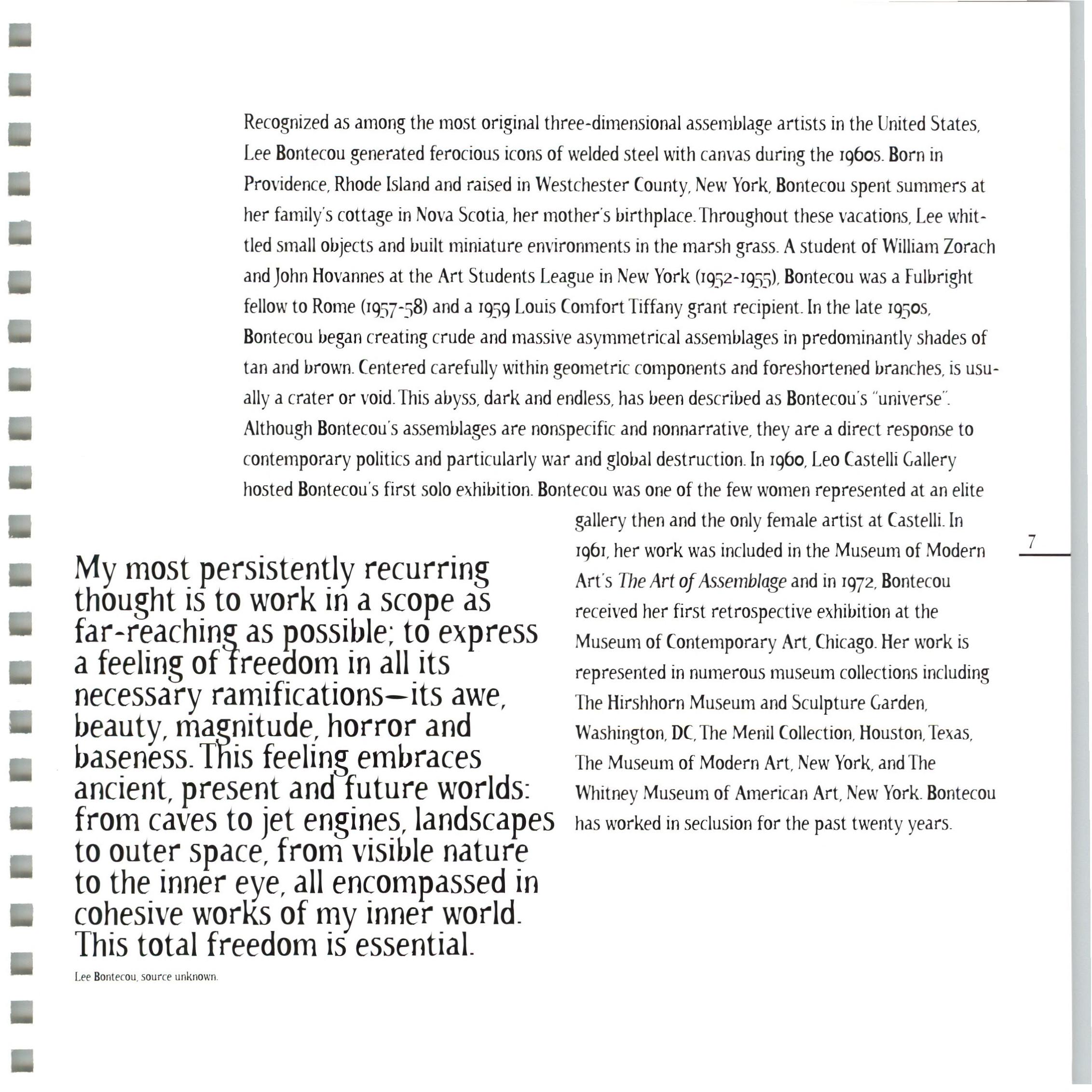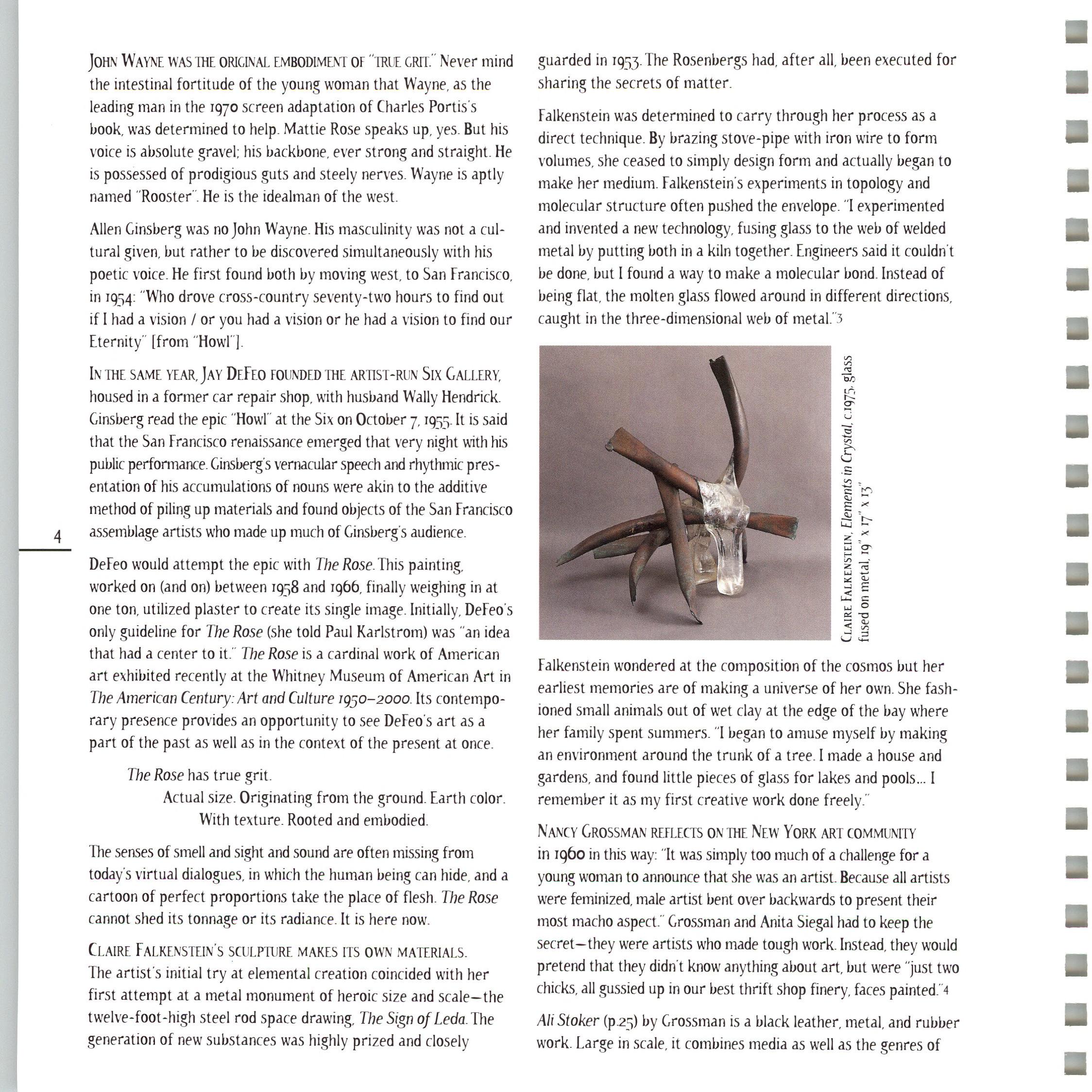
3 minute read
Falkenstein. interview with Charlotte Streifer Rubinstein. 1980
True G rit
ABBY H o ffm a n FLIPS ME THE FINGER. It is a parting gesture for the year 2000 on the hack cover of photographer Richard Avedon's The Sixties- And if I don't get Hoffman s meaning from his image. I can read the text on his forehead: "FUCK".
True C rit includes twenty-one works by seven female artists created during this era of dissent hut, "the sixties" is possibly a misnomer. Erupting well before the decade officially began, the tone of the time mushroomed when the United States bombed Hanoi and did not end until after the 1973 cease-fire in Vietnam. For most of this time, feminism was not in the cultural picture for these artists
A n u n t it le d in k d r a w in g o f 1951 by L o u is e B o u rg e o is (p.12) made in the year that Jack Kerouac wrote the beat classic On the Road, is the earliest work in the exhibition. I.ines drawn across the vertical page one after another are parallel and dense. A p a ir of pointed form s made of strokes put down like threads duck into the frame from the top right, threatening to snap together. Wings or thighs sweeping to the sides below leave a white ovoid. The internal female landscape suggested is neither soft nor pink.
Bourgeois has built her form s on the diagonal and askew. Hardly on the road herself, the artist was instead embedded in time and place. She is Betty Triedan's unhappy housewoman of the 1950s—as the wife of art historian Robert Goldwater and mother of three. A feminine mystique in which the m ystery is the missing, uprooted self. Living in New York with its international art world. Bourgeois nevertheless worked in isolation and in her own mind, in secret.
Because of the profession and personality of my husband, I lived among these people...they tolerated me...but they refused to help me professionally. The trustees of the Museum of Modern A rt were not interested in a young woman coming from Paris. They were not flattered by her attention. They were not interested in her three children. They wanted male artists."1
Bourgeois was plagued with questions about her right to be an artist. Before the 1970s, when feminism brought her oeuvre to greater public attention and offered interpretations appropriate to her struggle, she had not shown her work fo r ten years.
" L iv in g in A m e ric a I e xp ect t o g e t k i ll e d , " Hoffman told Avedon and Diane Arbus, pointing to the ultimate price that might be exacted for barefaced heresy. Nancy Spero's Poem I: Fuck You (i960) (p.33) screams the same obscenities, up front, scratched in black over and under an off-color field of brown and gray washes. Spero's profanity is the visceral plain talk of outsiders—a visual and verbal language of protest and refusal. And these paintings on paper of 1960, which already seem to be the height of scatology, only hint at the hostilities that will reach their full force in later works. Thus when Spero turns to literature, she chooses the texts of Antonin Artaud fo r their location on the margin:
A fter completing the W ar series I felt the necessity fo r using language, texts, and Artaud s own sense of social victimization opened up a way for me to externalize my position as an outsider...I was so far out in the art world—on the edge, if not actually over it— that by using the language of Artaud I could expel my hostility and resistance ...The voice of the other' (though masculine), provided a vehicle fo r my silenced voice as an a rtis t2
There is no decoration of shapes or figures in Spero's composition. In fact, she undoes form even as she formulates. Nor is there an illusion of harmony that would divorce this art from its own substance; no distillation that would refine and restrict its sensibility. Spero's method and message are immediate and active. The two schematic images at the base of her page move in the same direction. Nomadic journeyers in perpetual motion, they have been called angels. If so, their search is fo r the sensuous in the divine, perhaps the dark place where body and soul can be vehicles for liberation. In this pursuit, matter matters.
Spero has true grit. True: to be exactly as it appears. Grit: to press with a grating noise.




